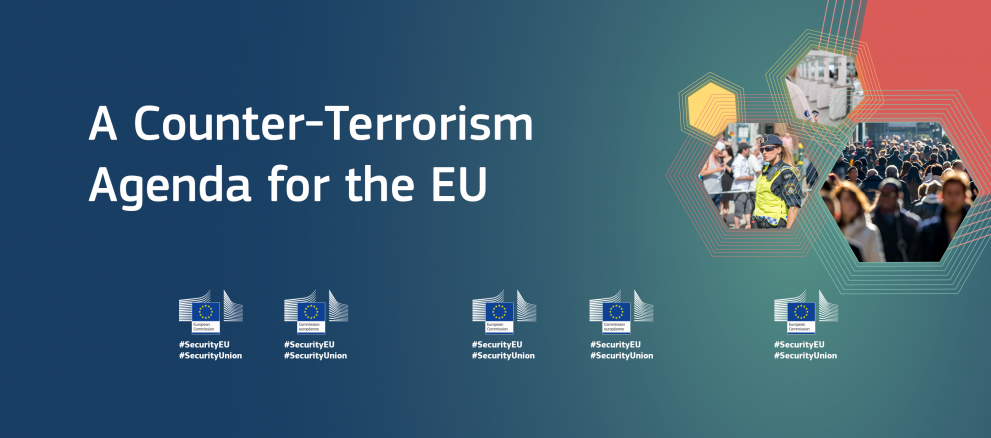
Today, the Commission presented a new Counter-Terrorism Agenda for the EU to step up the fight against terrorism and violent extremism and boost the EU's resilience to terrorist threats. Building on existing achievements, the Agenda will support Member States in anticipating, preventing, protecting and responding to the terrorist threat. Europol, the EU Agency for law enforcement cooperation, would deliver better operational support to Member States' investigations under the revised mandate proposed today.
A Counter-Terrorism Agenda: anticipate, prevent, protect and respond
The recent spate of attacks on European soil have served as a sharp reminder that terrorism remains a real and present danger. As this threat evolves, so too must our cooperation to counter it. The Counter-Terrorism Agenda includes several measures:
- Identifying vulnerabilities and building capacity to anticipate threats: Security research will help enhance early detection of new threats, whilst investing in new technologies will help Europe's counter terrorism response stay ahead of the curve.
- Preventing attacks by addressing radicalisation: this will include measures to counter the spread of extremist ideologies online, as well as actions to strengthen preventive action in prisons, rehabilitation and reintegration of radical inmates, and actions to improve knowledge sharing.
- Promoting security by design and reducing vulnerabilities to protect cities and people: the EU will step up efforts to ensure physical protection of public spaces including places of worship, and critical infrastructures. The Commission will support Member States in ensuring such systematic checks at borders.
- Stepping up operational support, prosecution and victims' rights to better respond to attacks: the Agenda puts forwards several initiatives to improve police cooperation, including an EU police cooperation code. The Commission will work with Member States to identify possible legal, operational, and technical solutions for lawful access to encrypted digital evidences, while protecting privacy and security of communications, The Commission will work to enhance the protection of victims of terrorist acts, including to improve access to compensation.
Stronger mandate for Europol
The Commission is proposing today to strengthen the mandate of Europol, the EU Agency for law enforcement cooperation. Given that terrorists often abuse services offered by private companies to recruit followers, plan attacks, and disseminate propaganda inciting further attacks, the revised mandate will help Europol cooperate effectively with private parties, and transmit relevant evidence to Member States.
In addition, in the context of on-going efforts to detect Foreign Terrorist Fighters, the Commission proposes to enable Europol to enter information on terrorist suspects based on third-country sourced information in the Schengen Information System, the most widely used information-sharing database in the EU, providing real-time information to police officers and border guards.
Background
Today's Agenda is a further deliverable of the EU Security Union Strategy for 2020 to 2025, in which the Commission committed to focus on priority areas where the EU can bring value to support Member States in fostering security for those living in Europe.
The Counter-Terrorism Agenda builds on the measures already adopted to deny terrorists the means to carry out attacks and to strengthen resilience against the terrorist threat. That includes EU rules on combating terrorism, and prevention of radicalisation, on addressing terrorist financing and trafficking of firearms.
More Information
- Press Release
- Press Questions and Answers
- Communication on a Counter-Terrorism Agenda for the EU: Anticipate, Prevent, Protect, Respond
- Proposal for a Regulation strengthening Europol's mandate
- Strengthening Europol's mandate – Impact assessment Part 1
- and Part 2
- Strengthening Europol's mandate – Executive summary of the impact assessment
- Proposal for operation and use of the Schengen Information System (SIS) as regards the entry of alerts by Europol
- EU policy on combating terrorism
- EU policy on prevention of radicalisation
- EU policy on addressing terrorist financing
- EU policy on trafficking of firearms
Details
- Publication date
- 9 December 2020
